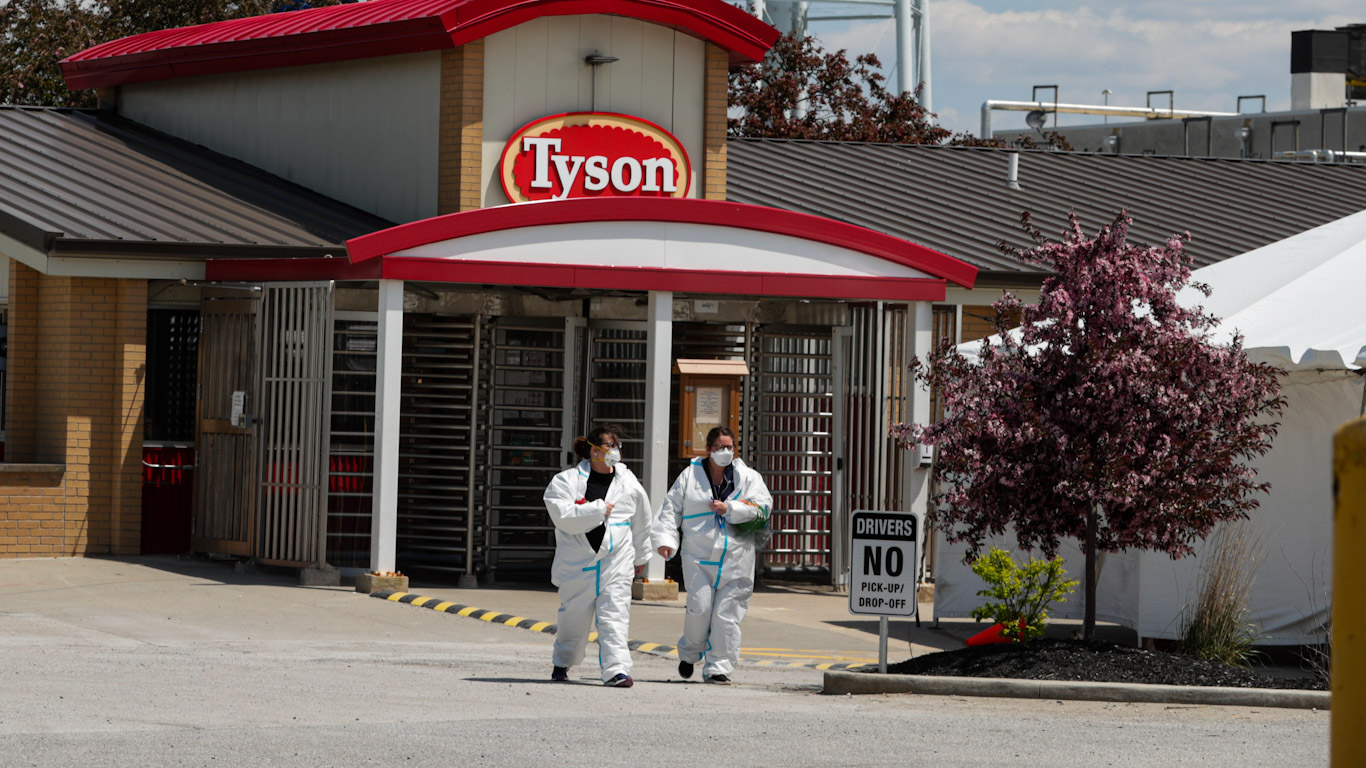There is a bottleneck in the nation’s food supply chain. Specifically in the meatpacking operations of the country’s “big four”: Tyson Foods, National Beef, Cargill, and Brazilian giant JBS – the world’s largest processor of beef and pork products. The logjam has been exacerbated by a slew of coronavirus outbreaks in Iowa meatpacking plants and several other plants across the United States, but the real problem seems to lie with big ag’s penchant for unfair antitrust practices and monopolistic designs.
In a protracted battle against the powerful industry that dates back a hundred years, the latest salvo emerged out of Kentucky last week when that state’s Commissioner of Agriculture, Ryan Quarles and Attorney General Daniel Cameron called for the Justice Department to “undertake and investigation into the potentially illegal anticompetitive practices by some meatpackers in the cattle industry.” Their jointly issued letter to the DOJ was motivated by grievances from Kentucky cattle farmers who claim the price they are being paid for their animals has dropped between 30 and 40 percent as the pandemic-induced shortfalls in production send beef prices sky-high.
Some economists, like Kansas State University’s Ted Schroeder, believe the current problem is the logical result of supply and demand forces, saying that there is “plenty of cattle” to go around and that challenges lie in getting them “through the system.” This position is, of course, shared by the companies that are under fire, like Tyson Foods, which published an open letter in the Washington Post and the New York Times back in April, warning that the shuttering of production facilities due to COVID-19 would severely impair the ability of farmers to sell their livestock.
The reality though is that these economic causalities are inextricably tied to the stranglehold of these enormous corporations, which control over 85 percent of U.S. beef production, resulting in a growing chorus calling for the break-up of these massive corporations.
Election-year lip service
In early May, a bipartisan group of eleven state’s attorney generals (AGs) authored a letter addressed to the Department of Justice warning of the threat of “increasing consolidation” in the beef industry and warned that the main players like Tyson, Cargill, and JBS are able to “artificially” lower the prices they pay suppliers, while simultaneously gouging consumers.
The AGs stopped short of actually calling for a formal investigation ut did recommend reviewing “regulatory strategies” that would “promote competition.” It is unclear, nevertheless, how committed legislators really are to changing the status quo and despite an executive order issued by President Trump the day after John Tyson’s open letter to keep beef processing plants open via the Defense Protection Act, the virtual monopoly currently enjoyed by the big four continues to be largely unchallenged.
Only in states like Iowa, Wisconsin, and Missouri, where a significant portion of the voter base works in farms, does there seem to be any kind of political will to address the issue. Following Trump’s order, Senators Josh Hawley (R-Mo.) and Tammy Baldwin (D-Wis.) asked the Federal Trade Commission to open an antitrust investigation “into the meatpacking industry and its potential to cause significant disruptions in the food supply chain.” But, just how consequential such actions will be in the end remain to be seen. Considering the long-drawn-out history of the problem, the sudden concern by politicians might just be election-year lip service.
Out to the slaughterhouse
A lawsuit filed by the Ranchers Cattlemen Action Legal Fund United Stockgrowers of America (R-CALF) and others in April of 2019 accused Tyson, Cargill, National Beef Packing Co., and JBS of conspiring to fix beef prices and manipulate the futures market since 2015. The class-action suit accused the beef processors of “collectively reducing their slaughter volumes and purchases of cattle… manipulating the cash cattle trade” among other egregious forms of market manipulation and sabotage.”
The plaintiffs claim that the big four colluded to make selling cattle “an unmanageable nightmare” thereby increasing their “collective leverage over producers.” In addition, the claimants accused the large companies of purposely blocking market access to domestic ranchers by flooding the U.S. with foreign cattle from Mexico and Canada and using loopholes in the law to label foreign beef a “Product of the USA,” a move which has seriously affected the grass-fed cattle industry in the country.
American ranchers and farmers have lost patience with the legislative and executive branches of government, who they see as not heeding their requests to curtail the big corporations’ monopolistic practices, which also extend to other sectors, such as the packaged seafood industry. They hope to take their fight to the third branch of government in hopes that the judiciary will help shift the balance of power. But, as the COVID-19-driven shutdowns continue to open the door for greater consolidation across industries, it is a battle that may have already been led to the slaughterhouse by well-entrenched transnational interests.
Feature photo | Workers leave the Tyson Foods pork processing plant in Logansport, Ind., May 7, 2020. Michael Conroy | AP
Raul Diego is a MintPress News Staff Writer, independent photojournalist, researcher, writer and documentary filmmaker.
The post COVID-19 is Laying Bare How Big Ag is Taking America’s Small Farmers to Slaughter appeared first on MintPress News.
